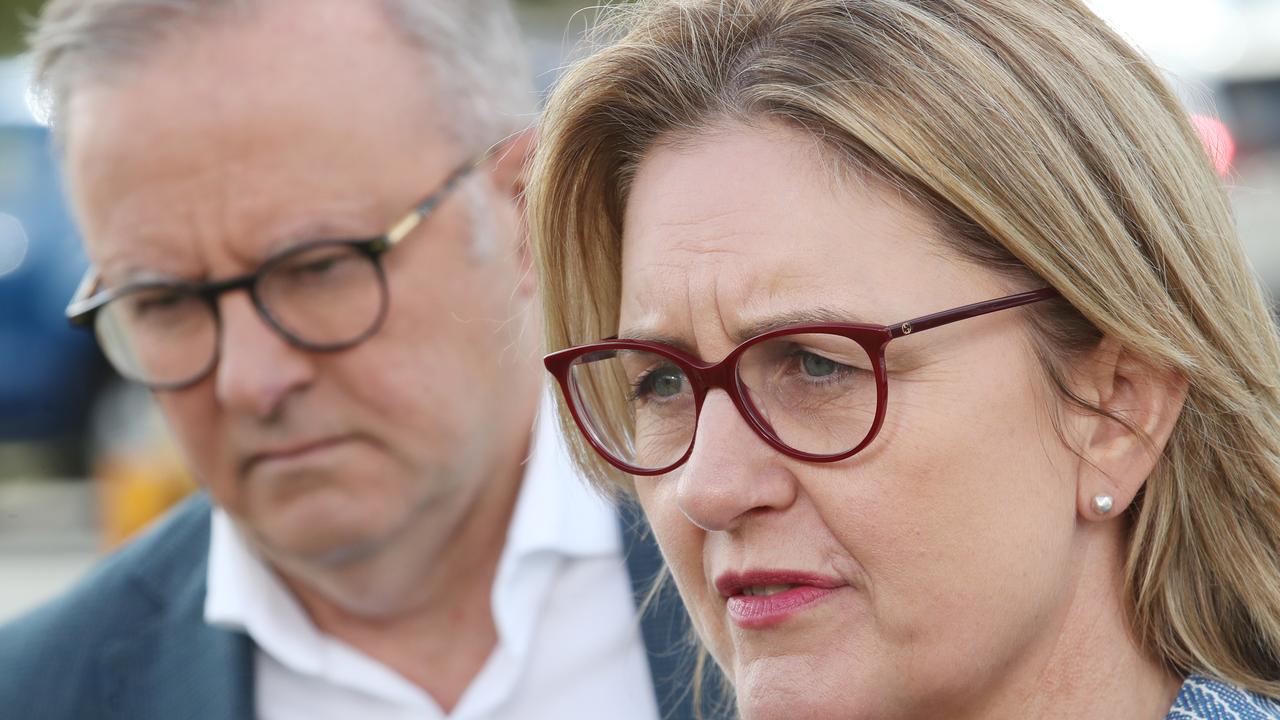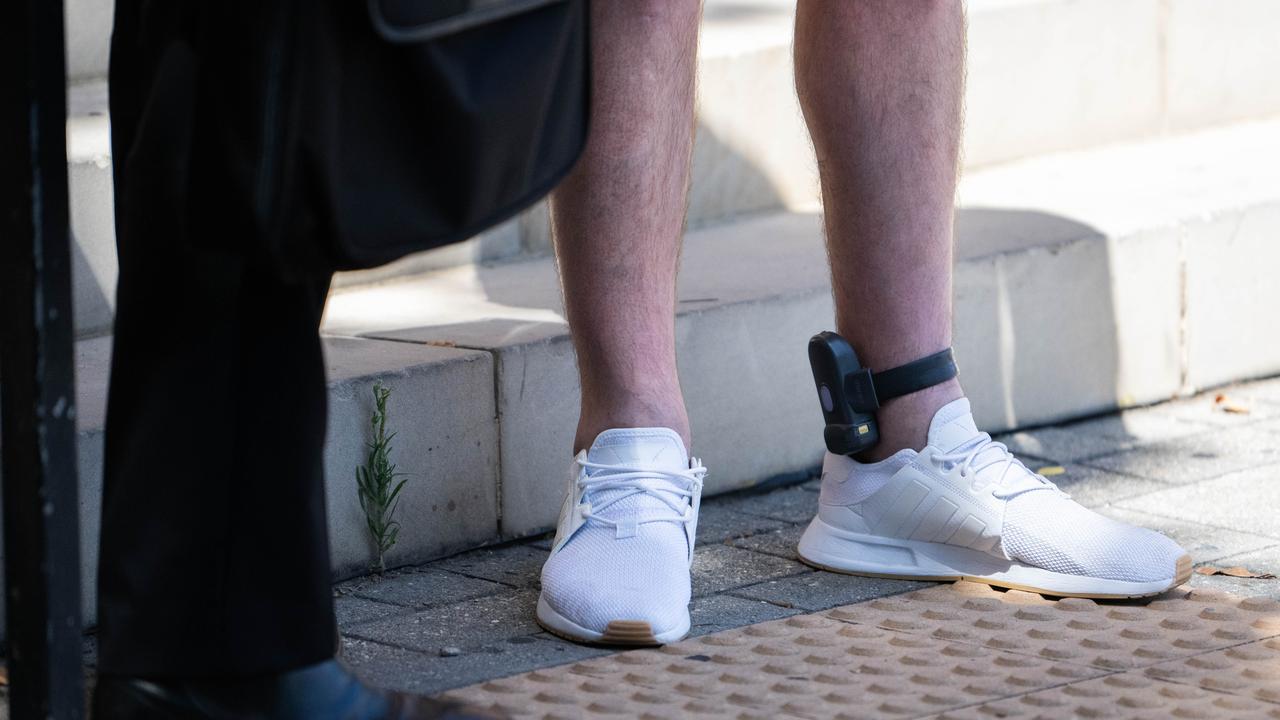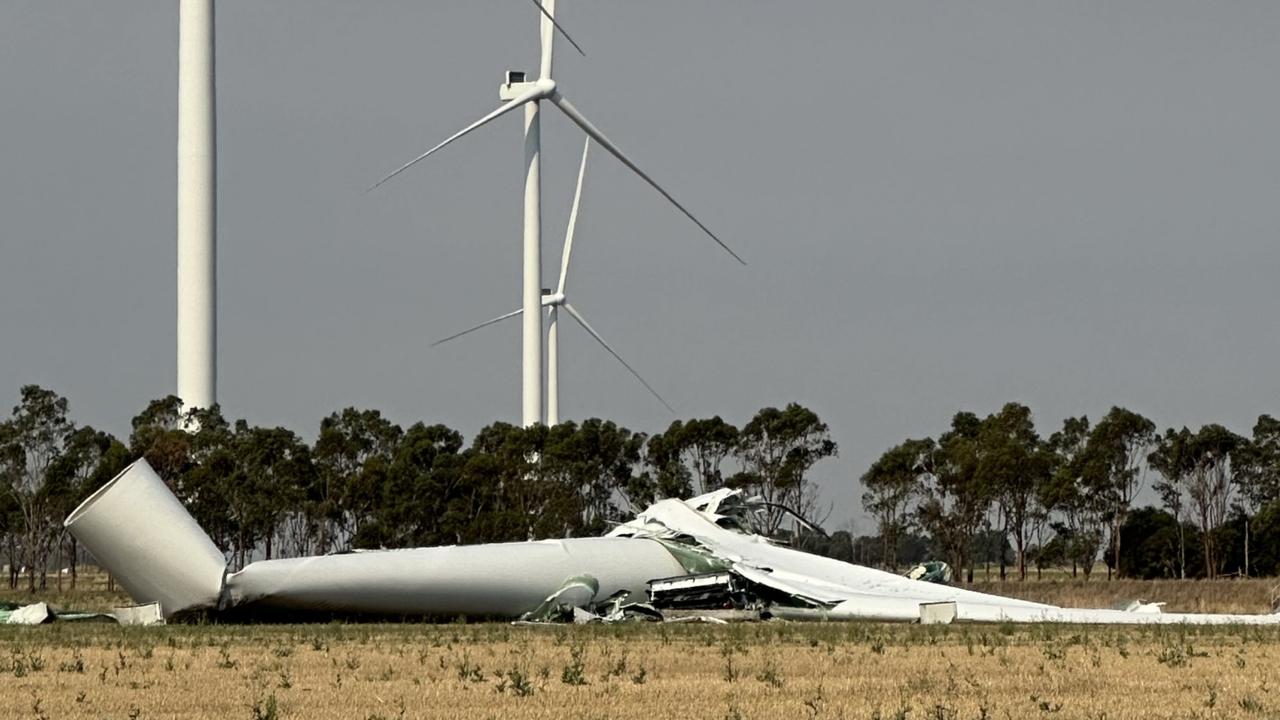Hotel inquiry calls on Sutton over conflicting evidence
Brett Sutton has been given a timeframe to explain conflicting evidence about the use of private security to the hotel quarantine inquiry.
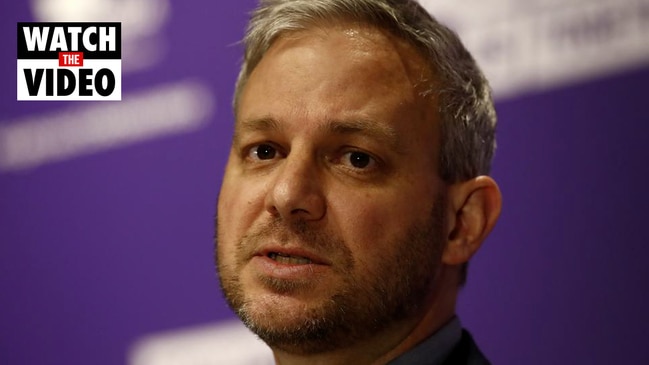
Victoria’s chief health officer Brett Sutton has been given seven days to provide a statement to the hotel quarantine inquiry to explain conflicting evidence as it was revealed he instructed his lawyers to withhold a key email.
Senior counsel assisting Tony Neal QC told an extraordinary sitting of the inquiry board on Tuesday afternoon an affidavit would be served on Professor Sutton.
It relates to an email chain to health department officials in March advising private security had been contracted to guard returned travellers in hotels in Victoria.
Professor Sutton acknowledged receipt of the email.
However, when Professor Sutton appeared at the inquiry, he said he first found out about private security being used after the virus outbreak at the Rydges on Swanston Hotel in late May.
Professor Sutton has stood by his testimony as honest.
He admitted to seeing the email at the time but the content about the security arrangements did not “register” with him and he had received up to 30,000 emails since the pandemic started.
Therefore, as he did not read the details of the emails he did not think they needed to be provided.
“Professor Sutton further instructed us that he did not consider he needed to clarify his evidence and therefore the email did not need to be provided to the Board for that reason,” the email from the DHHS to the inquiry said.
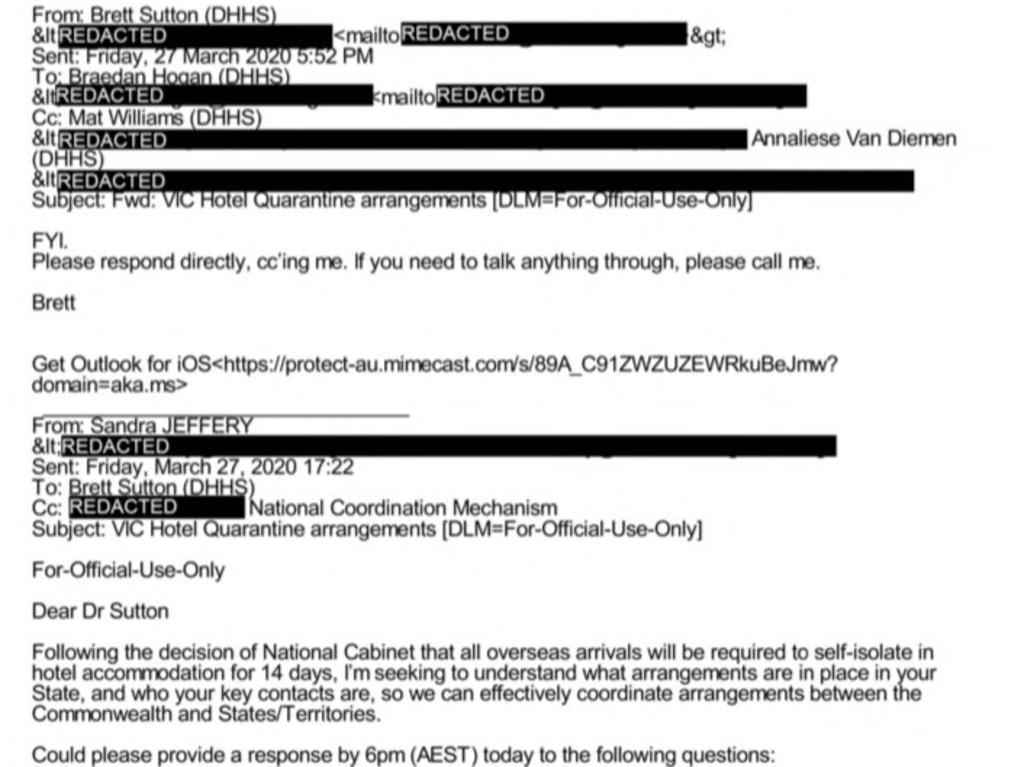
CALL TO ASHTON PROMPTS CALLS FOR INFORMATION
More bureaucrats are being asked for answers after it was revealed Victoria’s top public servant phoned the state’s top cop during a crucial six-minute window.
Senior counsel assisting Tony Neal QC told board chair Jennifer Coate the development also affected the inquiry’s work as it approached its November 6 reporting date.
It concerns phone call records of Premier Daniel Andrews’ top bureaucrat Chris Eccles, showing he called former chief commissioner Graham Ashton in a crucial six-minute window on the day the hotel quarantine program was announced.
Mr Ashton learnt private security would be used in the program some time between 1.16pm and 1.22pm on March 27 but couldn’t recall to the inquiry who told him.
Mr Eccles said he could not recall calling Mr Ashton during this time.
But in his statement announcing his resignation, Mr Eccles said his phone records did show he called Mr Ashton for just over two minutes at 1.17pm.
However, he said his phone call did not mean the decision to use private security came from him or the Premier’s department.
Nobody has been able to tell the inquiry after hearing 25 days of evidence who decided to use private security.
Mr Neal said the board had asked “certain parties” for further answers via affidavits to questions about private security.
“Having obtained this further information, the inquiry team requested certain parties to
provide further answers on affidavit to questions directed to the issue of the decision to engage private security contractors in the hotel quarantine program and to provide further documents related to that issue,” he said.
Mr Neal said the parties are being asked to address new material, not the subject of previous evidence.
He said there is no basis to infer or speculate that a view has been formed yet about the veracity of evidence already given about the decision to use private security.
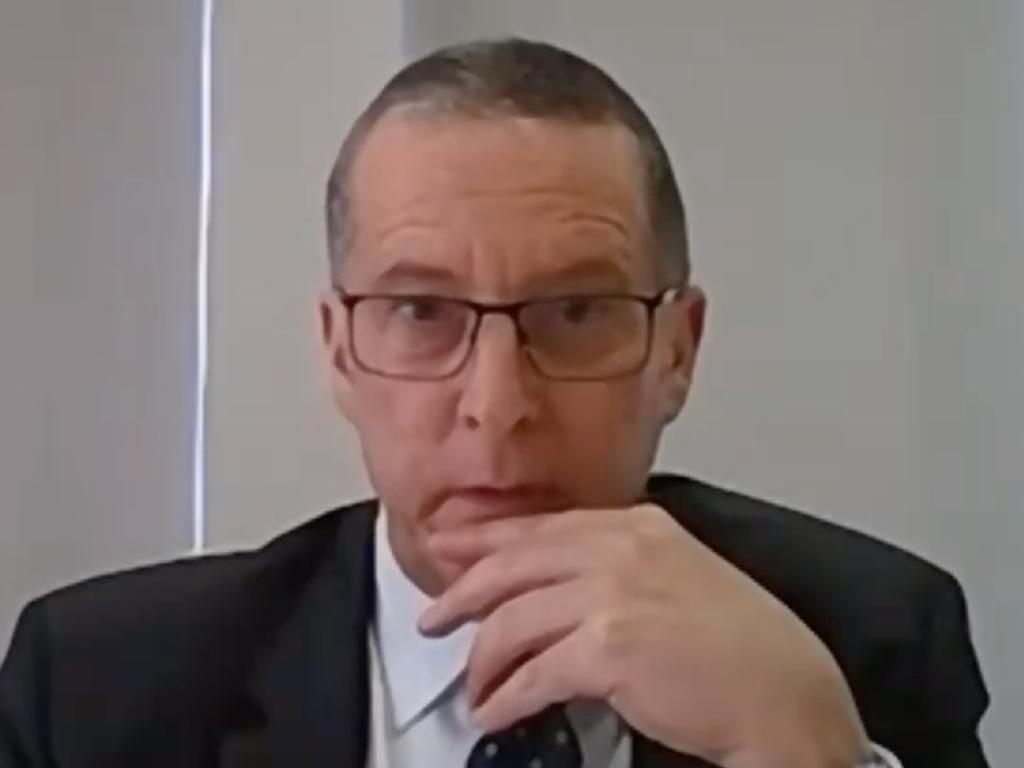
HEALTH DEPARTMENT ACCUSED OF OMITTING RELEVANT EMAIL
Counsel assisting, Tony Neal, has accused Department of Health and Human Services lawyers of failing to provide a potentially key email to the inquiry until last week, because it didn’t believe it relevant.
The email was in documents the DHHS lawyers provided the inquiry last week, and headed: ‘Information - Chain of Command - people in detention’.
The email is from then deputy public health commander Dr Finn Romanes, dated April 1, and addressed to a large number of DHHS officials.
Dr Romanes says in the email the chain of command began with Chief Health Officer Brett Sutton, followed by his deputy, then the deputy public health commander.
“All policy and oversight of people in detention is being handled in a strict chain of command, from Chief Health Officer to Deputy CHO to Deputy Public Health Commander Planning (Finn Romanes) Director Health Regulation and Reform (Meena Naidu) to Authorised Officers,” he says in the email.
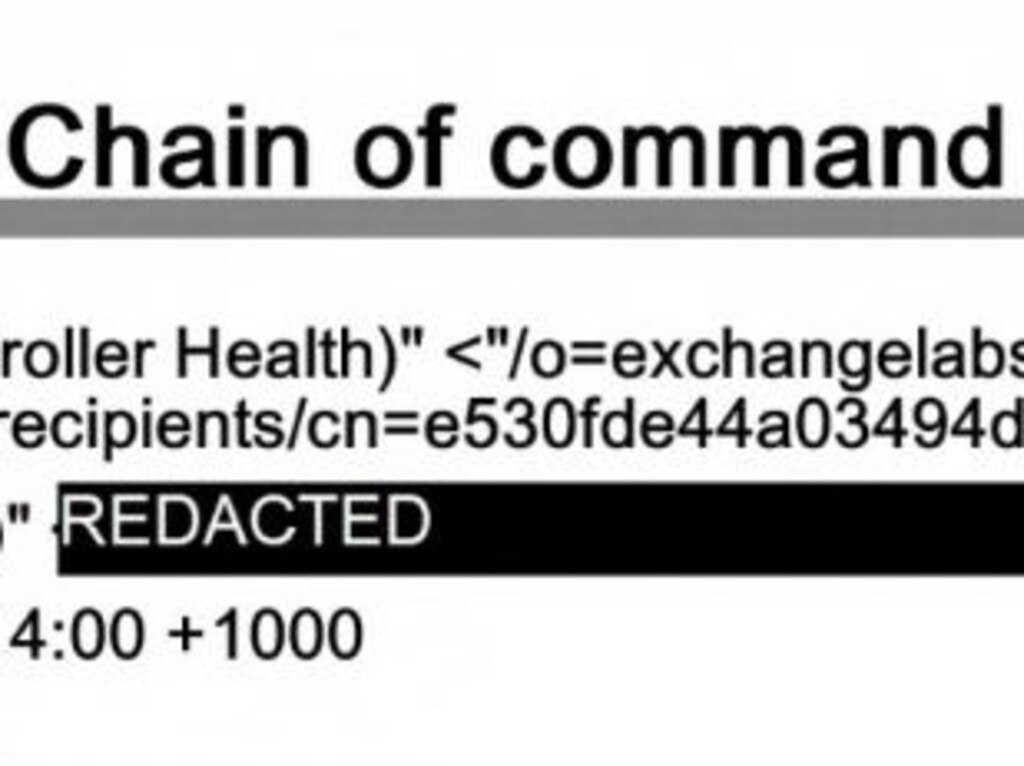
“It is important that all direction, policy, reporting and arrangements do not break this chain.
“No policies, directions, exemptions, reporting, meetings to agree policy on these people or other activity outside this chain please, unless requested or overseen by the chain.
“This strict view is vital to safeguard the wellbeing and duty of care owed by the state to these people and legal and other risks to the department and its staff, who are administering this detention regime on behalf of the Deputy Chief Health Officer and Chief Health Officer.”
In a cover letter providing the email, the DHHS solicitors advised they weren’t considered relevant.
However, Mr Neal disagreed, telling board chair Jennifer Coate: “This document on its face goes to matters which occupied a considerable amount of the Board’s time, and you may consider it adds some weight in one direction or another to your deliberations as to who was in charge of the detention regime”.
Mr Neal said the documents were not previously produced to the board, despite the department being asked to provide documents in line with the board’s terms of reference.
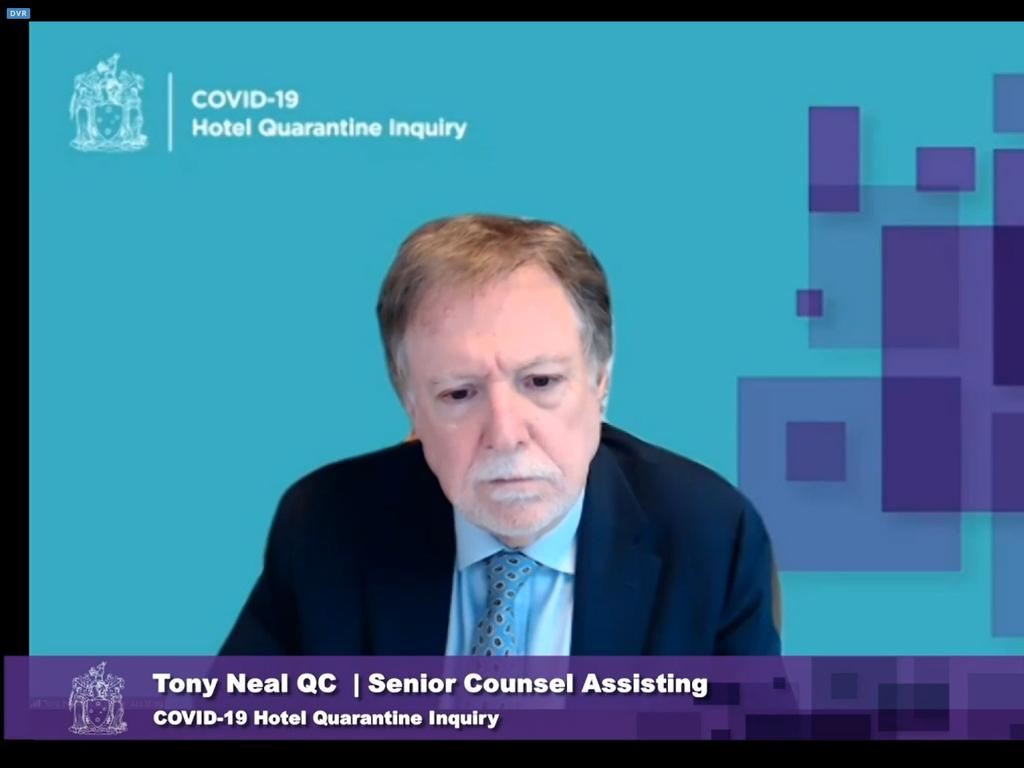
The department said on the cover letter: “In the context of a review of up to 500,000 documents, the enclosed documents were not considered relevant to an Notice To Produce and not critical (as defined by the Board). We also note the considerably tight time frames of this Inquiry”.
Mr Neal said the DHSS solicitors have been asked by counsel assisting to explain why the documents were not produced to the inquiry.
A further two emails were also received by the board on Tuesday including one from Dr Finn Romanes, headed “Governance of mandatory detention implementation”.
DHHS secretary Kim Peake has also been asked to provide an affidavit explaining emails provided.
Ms Coate said until further material requested by the board is received, she cannot determine the next steps, including if an extension to the November 6 deadline is needed.
“Most unfortunately, these new developments, it has to be said, may unsettle the due date for the report,” she said.
EXTRAORDINARY SITTING OF HOTEL INQUIRY
Key government figures who could be recalled to the inquiry for a grilling after the board resumes on Tuesday for an extraordinary hearing.
The inquiry will sit briefly at 2pm to discuss the next steps after incomplete and contradictory evidence emerged in recent weeks.
Only senior counsel assisting Tony Neal QC and board chair Jennifer Coate will be present for the hearing.
During his evidence to the inquiry, Professor Sutton said he was not aware private security was being used in hotel quarantine until the first virus outbreak in late May.
However, it has emerged since that emails he received weeks earlier did advise Victoria would be relying on private security.
Professor Sutton has conceded he was involved in the March 27 email chain, but said he received up to 150 emails a day and the reference to private security “did not register”.
He had told the inquiry that until the outbreaks, he had no reservations about the scheme, but in hindsight, using the guards posed a risk.
“I can see that using a highly casualised workforce, generally from a lower socio-economic background, where that means that poor leave provisions limit how one can care for and financially support one’s family if unwell,” he said in his evidence.
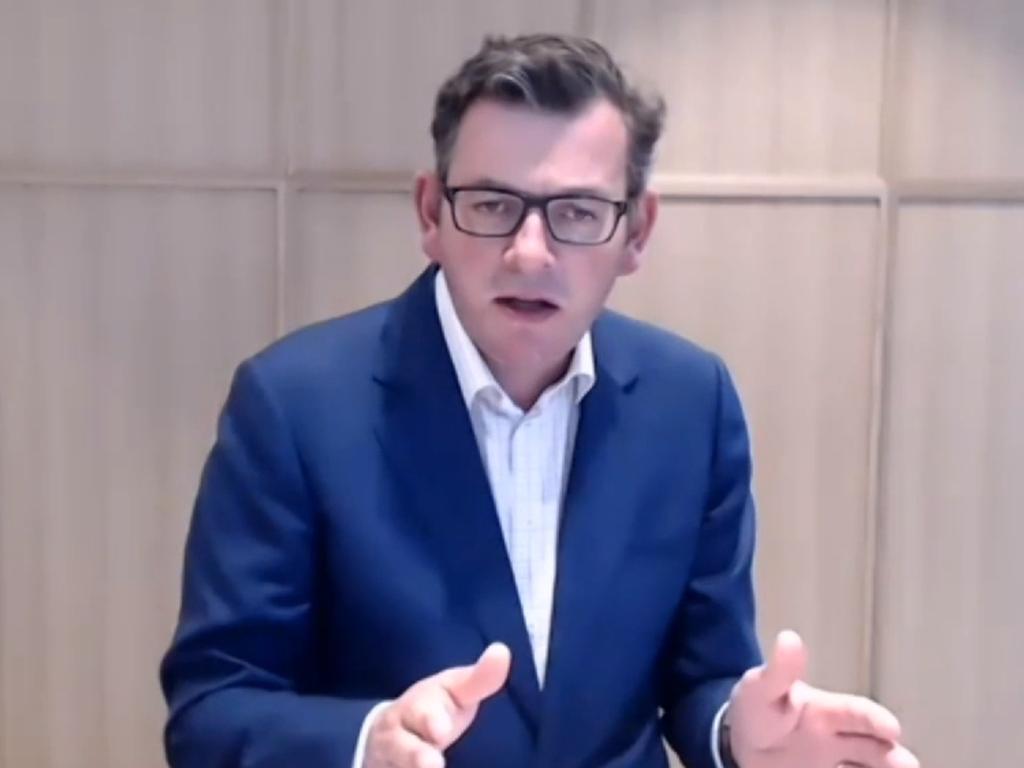
The board concluded public hearings on September 28, but since then, it has received information, including phone records of key players such as Victorian Premier Daniel Andrews and top public servants.
The new information could mean witnesses are recalled or at least asked to produce additional statements.
It could also force the board to seek an extension beyond its November 6 deadline to deliver its findings and recommendations.
Premier Daniel Andrews said on Tuesday he had no knowledge of the inquiry’s meeting on Tuesday.
He said there had been no request by the board to extend its reporting deadline or for extra funds.
“I’ve got no expectations at all. I’ve got no knowledge of what they’ll be doing,” Mr Andrews said.
“I‘ve certainly not been called but I don’t know whether anyone else has been called. I’ve got no knowledge of what they’re doing today because they are an independent board and they’ll do whatever they think is appropriate.
“Any requests of any other information … as we have always done of course, we would hand that up.”
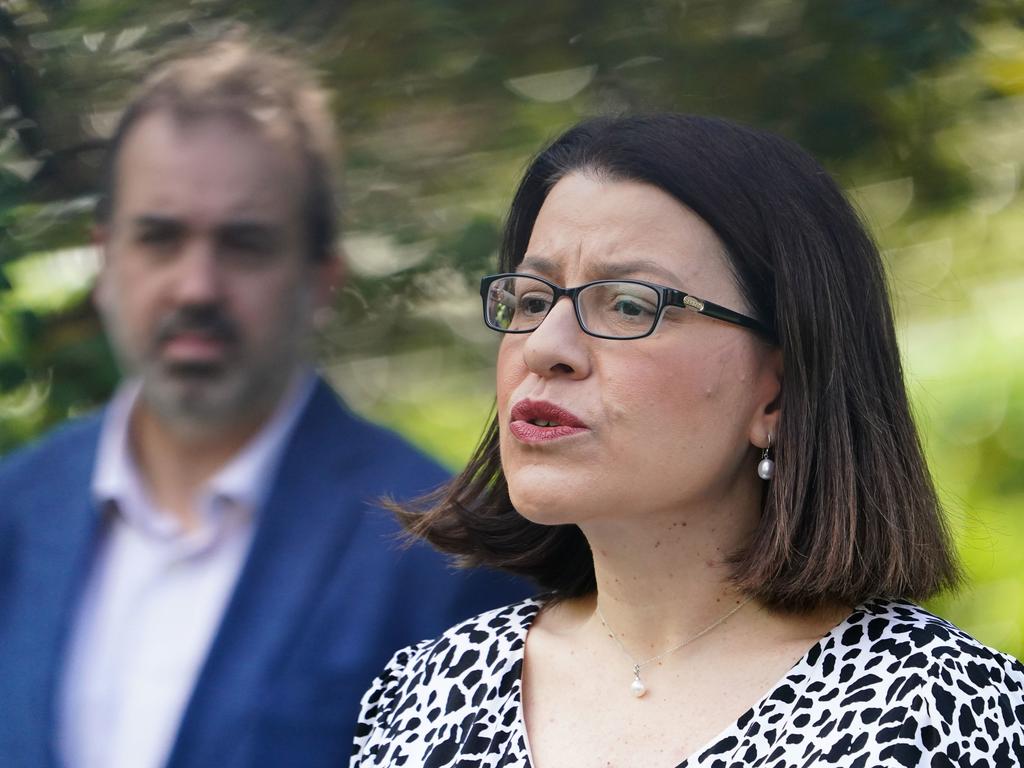
Former Department of Premier and Cabinet secretary Chris Eccles resigned after his phone records revealed he called Graham Ashton on March 27, two minutes after the former Victoria Police chief texted him seeking information about the use of private security.
Mr Eccles had told the inquiry his phone records did not show he had responded to Mr Ashton’s texts that day. He denied telling Mr Ashton private security would be used.
No one has been able to tell the inquiry who decided to use private security in the botched scheme, which has been blamed for almost all of Victoria’s second COVID-19 wave that has led to more than 700 deaths.
Former health Minister Jenny Mikakos also quit after Mr Andrews’s evidence on the inquiry’s final sitting day. She has urged the board to treat his evidence “with caution”.
In late September, the board requested an extra $2.7 million in funding, bringing its total budget to $5.7 million.
Read related topics:Melbourne

